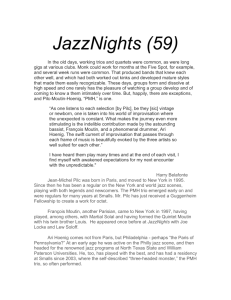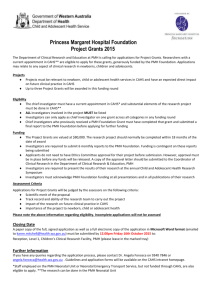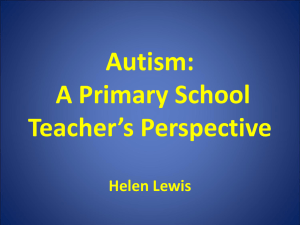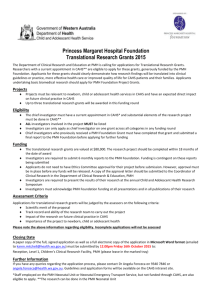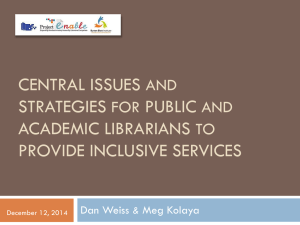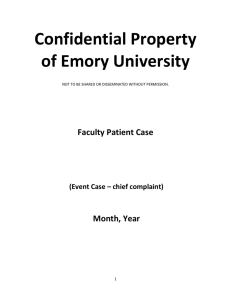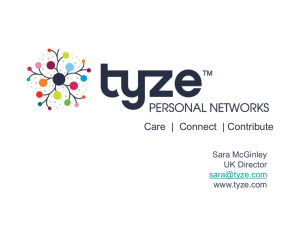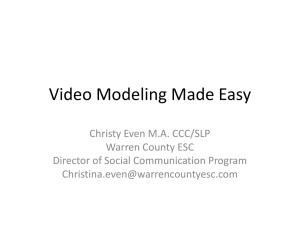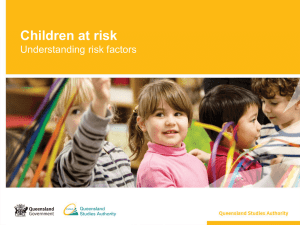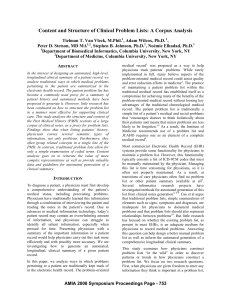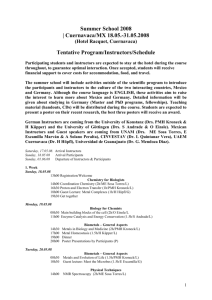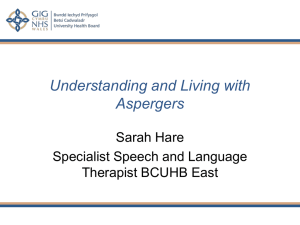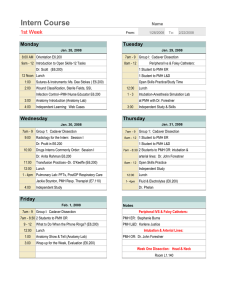Psycho Education Training ASD Exeter Conference S
advertisement
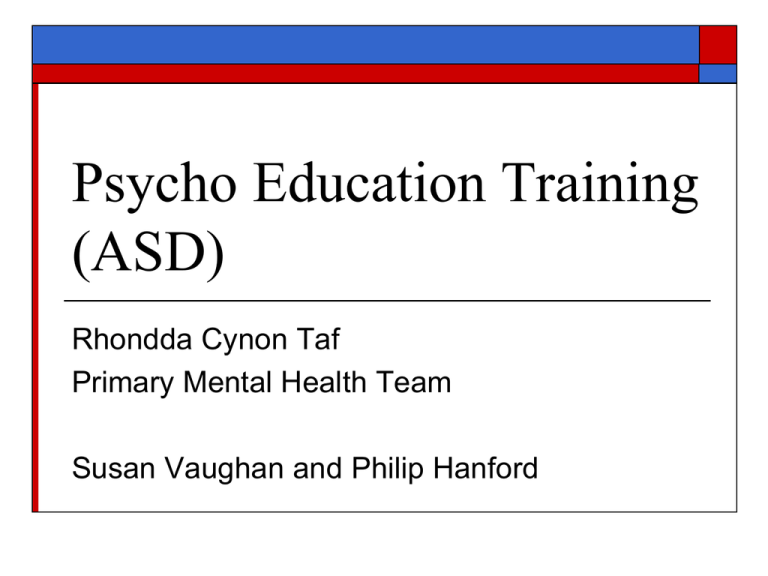
Psycho Education Training (ASD) Rhondda Cynon Taf Primary Mental Health Team Susan Vaughan and Philip Hanford Background: RCT Children and Young People Plan 2008-2011 Identifies the need to provide: “Improved facilities for access to services and support for individuals affected by Autism.” “Develop and implement an effective multiagency training programme to increase the awareness and skill of a range of staff in supporting children and young people” Preliminary work Discussions between Ontrack, CAMHS and PMH agreed the need for ‘something’ to help families post ASD assessment, and diagnosis. PMH floated the idea that training could be introduced thereby addressing critical elements of the PMH role A pilot training opportunity was agreed, working collaboratively with Ontrack AIM OF TRAINING PROGRAMME To provide an informal meeting place where parents / carers of a child with a diagnosis of Aspergers can meet. To provide an educational / training facility that parents /carers can access to update their knowledge and skills regarding Aspergers. To empower parents so they are aware of, and may access local and national services. AIM OF TRAINING PROGRAMME To develop the dynamics of the group prior to inviting guests and speakers. To help the core of the group identify professionals who may be useful to their developing understanding of community services. To invite identified professionals who can inform and educate parents / carers regarding the remit of their agency AIM OF TRAINING PROGRAMME – Tier 1 professionals To provide an informal training programme that Tier 1 professionals can access, and receive, training from both the ‘guests’ and parents / carers. To offer Tier 1 professionals a holistic perspective regarding topic based training, and challenges for carers and professionals. Referral Process Referrals to Group 1 came from CAMHS, PMH and OnTrack Referrals to Group 2 came from CAMHS, PMH, OnTrack and Consultant Paediatrician. Referral Meeting PMH met with each family referred to the training, and informed them of the format. Families were invited to commit for the duration of the training programme, which was anticipated to be approximately 15 sessions. Honey and Mumford: Typology of Learners Kolb: Elaborations of the Experiential Learning Cycle The ‘CORE’ of the group - issues. Parents own mental health issues Parents with undiagnosed / diagnosed Aspergers Open /closed group The Facilitators ‘Thinking group’ means focusing on the group as a whole – ‘considering everything that happens in terms of the group context (also the wider context in which it is embedded –social, political, organizational) because this is where meaning is manifest’ (McDermott, 2002) Smith and Smith (2008) Group Facilitation – John Heron What I mean by a facilitator… is a person who has the role of empowering participants to learn in an experiential group. The facilitator will normally be appointed to this role by whatever organization is sponsoring the group. And the group members will voluntarily accept the facilitator in this role. By experiential group I mean one in which learning takes place through an active and aware involvement of the whole person – as a spiritually, energetically and physically endowed being encompassing feeling and emotion, intuition and imaging, reflection and discrimination, intention and action. Theories – Groupwork Bruce W. Tuckman (1965). Reflective Learning “A learning system… must be one in which dynamic conservatism operates at such a level and in such a way as to permit change of state without intolerable threat to the essential functions the system fulfils for the self. Our systems need to maintain their identity, and their ability to support the self-identity of those who belong to them, but they must at the same time be capable of transforming themselves.” (Schon, 1973) ‘Guests’ Guest speakers Guest observers EDUCATION /TRAINING GROUP (Aspergers) GROUP PROGRAMME 2012 – 2013 1. 13 April 2012 2. 3. 23 May 2012 17 May 2012 4. 31 May 2012 5. 14 June 2012 6. 7. 28 June 2012 12 July 2012 8. 20 Sept 2012 PMH Introductions / ‘Group Rules’ / Preparation for Group Programme PMH Anger Management Young Carers RCT Information Sharing opportunity Ed Psych Behaviour Support School Support Service and ASD Little Inspirations ASD – A Shared Experience Special Educational Needs Child & Educational Psychologist Social Stories Transitions Project, Real Opportunities EDUCATION /TRAINING GROUP (Aspergers) GROUP PROGRAMME 2012 – 2013 Cont’d 9. 10. 11. 12. 13. 14. 4 Oct 2012 18 Oct 2012 8 Nov 2012 15 Nov 2012 Cerebra CAMHS Consultant Education, Aspergers and Self Esteem CAMHS, Swansea Specialist ASD / ADHD services 22 Nov 2012 Head of Children &Young People’s Service Redesign / ASD Lead & Chair of ASD Steering Group and Emotional & Mental Health Project Officer, Cwm Taf Health Board 6 Dec 2012 Final Meeting Evaluation and Endings Ongoing support to be provided at agreed points Challenges Clarification of PMH Role Venue – location and costs ‘Needy’ individuals Challenging group dynamics Last-minute speaker cancellations Commitment to attend Evaluations (Core of group) Individual: Baseline / Session evaluations Mid Point Review Individual Group Objective (2011) Group 2 – Attendees (Apr – Sept 12) Parents 56 Education 53 Health 5 Social Services 1 Voluntary Sector 0 Other 1 Total 116 Group 2 – Evaluation (Apr – Sept 12) Session was Useful I learned something new I learned something which may help in my role I felt listened to 0 10 20 30 40 50 60 70 80 Percentage 1 2 3 4 5 6 7 8 9 10 90 100 Quotes “I think every parent with a child with Aspergers should be able to take part in groups like this” (2012) When I first heard about this group I didn’t know what to expect but as I felt isolated why not give it a chance I thought. From day one it has been informative and educational…. The benefits have seen me go from strength to strength mentally and physically and I no longer feel alone” (2012) Quotes “Knowledge is power. We feel more empowered to challenge professionals involved in our children's education, treatment etc” (2011) “Understand my child more and feel more able to cope with the difficulties they present” (2011) “Reassured that choices made are the appropriate ones. Support with decisions to make” (2011) “Mixed gender. Good to see dad’s” (2011) “Family life has changed for the better. My mental well being has improved thanks to the group, its facilitators and group members” (2011) “Not judged” (2011/2012) Benefits A cost effective training tool that utilises specialist Tier 1 professionals to disseminate information regarding their agency. The ‘core’ of the group continued to meet outside of the training forum, thereby offering continued support to each other. Group 2 are aware of Group 1 and have met some members. The RCT PMH training programme is: R Realistic C Comprehensive T Thorough P Positive / Practical M Mental (this relates to Phil mostly) The RCT PMH training programme is: R Realistic C Comprehensive T Thorough P Positive / Practical M Measureable The RCT PMH training programme is: R Realistic C Comprehensive T Thorough P Positive / Practical M Measureable H Holistic References Heron, John (1999) The Complete Facilitator's Handbook. London: Kogan Page McDermott, Fiona (2002) Inside Group Work. A guide to reflective practice. Crows nest NSW.: Allen and Unwin Schön, D. (1987) Educating the Reflective Practitioner, San Francisco: Jossey-Bass Schön, D. A. (1973) Beyond the Stable State. Public and private learning in a changing society, Harmondsworth: Penguin Smith, Mark K. (2001; 2009) 'Facilitating learning and change in groups', the encyclopaedia of informal education QUESTIONS? COMMENTS? Thank you Susan.Vaughan2@wales.nhs.uk (A ‘pie chart’ for Phil!)
